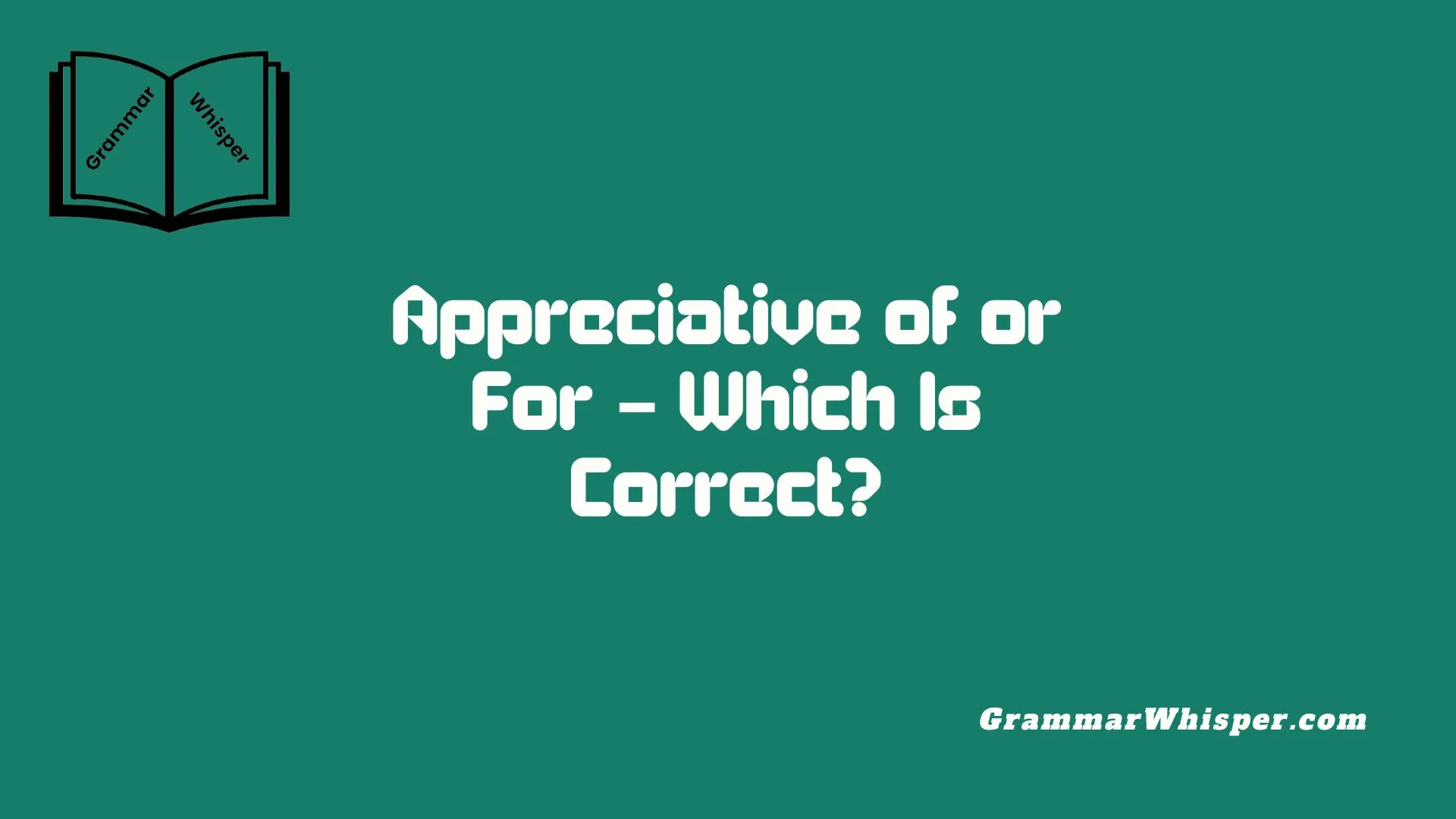When writing or speaking, choosing the correct preposition can shape how professional and polished you sound. I’ve seen people, especially non-native speakers, second-guess themselves on whether to say “Appreciative of or For.” While both may appear similar, a quick deep dive into how each phrase functions reveals a critical nuance. The meaning subtly shifts depending on which word follows “appreciative.” Saying “appreciative of” is widely accepted when showing acknowledgment or value – like being appreciative of someone’s help or time. This structure holds up in formal writing and real conversations because it sounds natural and professional.
On the other hand, “appreciative for” is less common and often feels awkward. Using the wrong preposition can slightly change the tone of your message, making it seem off to fluent speakers. That’s why knowing the right form truly matters. I once edited a grant letter where the writer used “appreciative for your support.” While not entirely wrong, changing it to “appreciative of your support” gave the sentence more confidence and polish. Such small choices may seem minor, but they carry weight. To use language with precision means understanding how each part works, and here, the right preposition makes all the difference.
Understanding the Nuanced Use of “Appreciative”
The word appreciative means showing gratitude or understanding. When you say you feel appreciative, you’re acknowledging value – either for something concrete or intangible.
- I’m appreciative of your help.
- She sounded appreciative of the opportunity.
You’ll notice “of” directly ties to the reason or object. That’s key: “appreciative of” highlights specific acknowledgment. We’ll explore more uses – but first, let’s dig into its roots.
Decoding “Appreciative of” in Context
“Appreciative of” appears in formal, academic, and business English when you want to highlight something clear and specific.
What fits well with “appreciative of”:
- Quality or effort: He was appreciative of her thorough research.
- Action: They felt appreciative of the support shown.
- Event or gesture: She became appreciative of the team’s initiative.
You use this form to name what you value – not just generic gratitude.
The Relationship Between “Appreciative of” and Specific Qualities
When someone mentions being appreciative of something, they’re pointing to a particular trait or quality. Notice the clarity:
- I’m appreciative of your honesty.
- We’re appreciative of your dedication.
That phrase tells exactly what earns your appreciation. It’s accurate, targeted, and purposeful.
Examples That Illustrate “Appreciative of” in Sentences
Here are real-world examples where “appreciative of” fits perfectly:
| Situation | Sentence |
| Business report | The board was appreciative of the accurate projections. |
| Academic feedback | Students felt appreciative of personalized feedback. |
| Team leadership | He was appreciative of his team’s commitment. |
| Customer service | We’re appreciative of your patience during delays. |
Each example specifies what’s valued – no vagueness, no fluff.
When Is “Appreciative for” Used? Understanding General Gratitude
“Appreciative for” sometimes appears in casual speech when expressing broad gratitude, without naming specifics.
- I’m appreciative for everything.
- She’s appreciative for all the support.
In these cases, “for” expresses general, heartfelt thanks. It’s not wrong – just less precise.
The Role of Prepositions in Conveying Meaning
Prepositions guide meaning:
- Of → indicates acknowledgment of something specific.
- For → indicates gratitude, often more general.
Think of it like this:
- You feel appreciative of the help someone gave you.
- You feel appreciative for the support you received overall.
One tiny word – but it alters your clarity and tone.
Why “Of” and “For” Can Change the Intent of “Appreciative”
Using “of” shows recognition. It implies awareness and thought. Using “for” shows gratitude. It’s more emotional, less specific.
Compare:
- I’m appreciative of your attention to detail. → analytical, specific
- I’m appreciative for your efforts. → warm, general
In formal emails, public speeches, or academic writing, clarity reigns – that’s why most grammar guides prefer “appreciative of.”
Historical Usage Trends of “Appreciative of” vs. “Appreciative for”
Data from the Corpus of Contemporary American English (COCA) and Google Ngram indicates:
- “Appreciative of” appears roughly 30 times more often than “appreciative for.”
- That ratio has held steady from the 1980s to today.
- British English mirrors that pattern too.
📊 Chart Insight: Since the 2000s, both phrases rose slightly. But “appreciative of” remains dominant – especially in professional and published texts.
Common Misconceptions and Errors in Using “Appreciative”
Writers often confuse “thankful for” with “appreciative for”, leading to awkward phrases:
- Incorrect: “I’m appreciative for the help.”
- Better: “I’m appreciative of the help.”
Top errors:
- Swapping prepositions
- Using “for” too broadly
- Overusing “appreciative for” in formal writing
Correction feels easy when you learn the pattern – but letting it gloss over costs clarity.
How Native Speakers Mistakenly Interchange These Terms
Even fluent speakers slip up.
“I’m really appreciative of all you do,”** vs “I’m really appreciative for all you do.”
Both sound fine in casual talk – but editors and recruiters read the nuance.
If you spot “appreciative for” in semi-formal texts, it often comes from:
- Mimicking “thankful for”
- Translator influence
- Dialect differences
Understanding the Importance of Contextual Clarity
In writing – especially professional messaging – precision matters.
Don’t let “appreciative for” holler where “of” should whisper.
Context decides:
- Internal memos, essays, and applications? → always use “appreciative of.”
- Casual thank-you notes or friendly emails? → “appreciative for” might feel warm and fine.
Final Advice on Mastering the Use of “Appreciative”
Here’s a quick checklist:
- ✅ Need to specify what you’re valuing? → use “of.”
- ✅ Express general gratitude in casual tone? → “for” is okay.
- ❌ Writing formality, clarity, or persuasion? → stick with “appreciative of.”
- ❌ Unsure? Use “of.” It never sounds wrong.
Quick mnemonic:
“APPRECIATIVE + OF = Object recognized” “APPRECIATIVE + FOR = Feeling expressed”
Summary Table Showdown
| Phrase | Usage | Tone | Context |
| Appreciative of | Specific acknowledgment | Formal | Reports, emails, academic work |
| Appreciative for | General gratitude | Casual | Texts, chats, informal emails |
Case Study: Subtle Switch, Big Difference
Scenario
A non-profit leader wrote in a grant report:
“We are appreciative for the volunteers’ efforts.”
What happened:
- Reviewers marked it down for sloppy tone.
- Revision: “We are appreciative of the volunteers’ efforts.”
- Result: Tone became more focused, professional, and precise.
That single change elevated the entire paragraph.
Final Thoughts
Choosing “appreciative of” signals clarity, respect, and professional polish. It’s not about sounding smart – it’s about sounding intentional.
When in doubt, default to “of”. That choice reflects precision, authority, and care.
Clarity counts. Your words matter. Pick them wisely.
FAQs
When can I use “appreciative for”?
You can use it in casual, emotional contexts – like texting a friend. Avoid it in formal writing.
Is “appreciative of” always correct?
Yes, especially when you want to show recognition clearly.
Can “thankful for” replace “appreciative of”?
Not exactly. “Thankful” is fine for gratitude, but still pairs with “for”. “I’m thankful for your support.”
Do American and British speakers use these differently?
Both prefer “appreciative of” in professional writing, though “appreciative for” appears more in informal British contexts.
Should I use “appreciative of” on my resume or LinkedIn?
Absolutely. It adds maturity, clarity, and polished tone to your profile.











